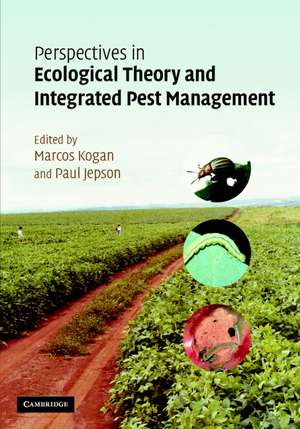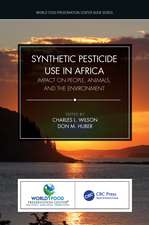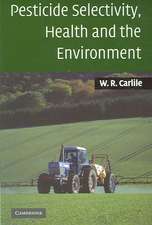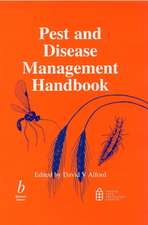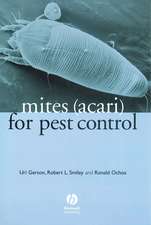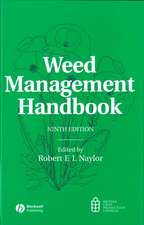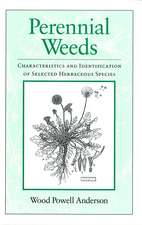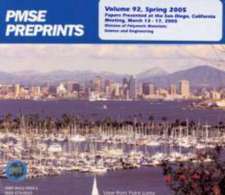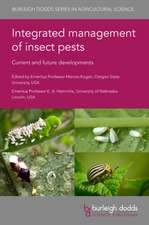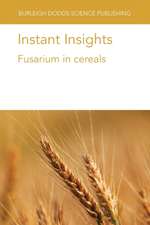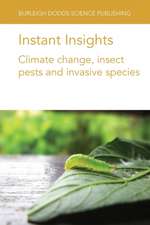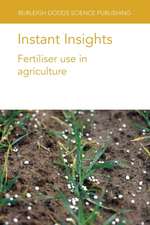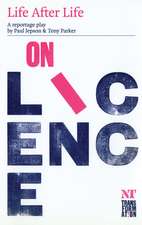Perspectives in Ecological Theory and Integrated Pest Management
Editat de Marcos Kogan, Paul Jepsonen Limba Engleză Hardback – 27 iun 2007
Preț: 757.46 lei
Preț vechi: 880.77 lei
-14% Nou
Puncte Express: 1136
Preț estimativ în valută:
144.99€ • 157.54$ • 121.87£
144.99€ • 157.54$ • 121.87£
Carte tipărită la comandă
Livrare economică 21 aprilie-05 mai
Preluare comenzi: 021 569.72.76
Specificații
ISBN-13: 9780521822138
ISBN-10: 0521822130
Pagini: 590
Ilustrații: 71 b/w illus. 25 tables
Dimensiuni: 180 x 258 x 32 mm
Greutate: 1.27 kg
Editura: Cambridge University Press
Colecția Cambridge University Press
Locul publicării:Cambridge, United Kingdom
ISBN-10: 0521822130
Pagini: 590
Ilustrații: 71 b/w illus. 25 tables
Dimensiuni: 180 x 258 x 32 mm
Greutate: 1.27 kg
Editura: Cambridge University Press
Colecția Cambridge University Press
Locul publicării:Cambridge, United Kingdom
Cuprins
Overview: ecology and IPM Marcos Kogan and Paul C. Jepson; 1. An ecologist's view of IPM Richard Levins; 2. Ecology and the human factor: ecological scales and levels of IPM integration Marcos Kogan; Part I. Level one IPM: Species- And Population-Level Processes Marcos Kogan and Paul C. Jepson: 3. Ecosystematics and IPM Darlene Judd; 4. Populations, metapopulations: elementary units of IPM systems Linton Winder and Ian Woiwod; 5. Arthropod behavioural ecology and IPM Ronald Prokopy and Bernard Roitberg; 6. Arthropod sexual behaviour and IPM Ring Carde; 7. Ecology of arthropod/ plant interactions and IPM John C. Reese and Marcos Kogan; 8. Nutritional ecology of plant feeding arthropods and IPM Antonio Panizzi; 9. Conservation biology, biodiversity and IPM Steve D. Wratten, Dieter F. Hochuli, Geoff M. Gurr and Jason Tylianakis; 10. Entomopathogen ecology in biocontrol systems Flavio Moscardi; 11. Ecological risks of biocontrol agents: impact on IPM Heikki Hokkanen, Joop van Lenteren and Ingeborg Menzler-Hokkanen; Part II. Level Two IPM: Community-Level Processes - Multiple Pest Marcos Kogan and Paul C. Jepson; 12. Long distance movement of arthropods and dynamics of crop field colonisation Keith Walters, Richard Baker and Ray Cannon; 13. Ecology of genetically transformed host plants and natural enemies George Kennedy and Fred Gould; 14. Host plants/ herbivores/ natural enemies: dynamics of tritrophic interactions Andrew P. Gutierrez and Johann Baumgärtner; 15. Weed ecology, habitat management and IPM Robert Norris; 16. Ecological bases of weed management with herbivorous arthropods and plant pathogens Peter McEvoy and Christopher C. Mundt; 17. Ecology of plant pathogens and IPM Joyce Loper; 18. Ecology of vertebrate pests and IPM Gary W. Witmer; 19. Ecological bases of habitat management for IPM Daniel McGrath; Part III. Level Three IPM: Ecosystems-Level Processes Marcos Kogan and Paul C. Jepson: 20. Ecosystems- concepts, analyses, and practical implications in IPM Timothy D. Schowalter; 21. Ecosystems ecology and IPM Clara Nicholls and Miguel Altieri; Part IV. Ecological Scale-Independent Processes Marcos Kogan and Paul C. Jepson: 22. Molecular ecology: applications to IPM Paul J. De Barro, O. R. Edwards and P. Sunnucks; 23. Ecotoxicology and IPM Paul C. Jepson; 24. Environmental/ ecological economics and IPM.
Descriere
A unique synthesis of the role ecology plays in integrated pest management.
